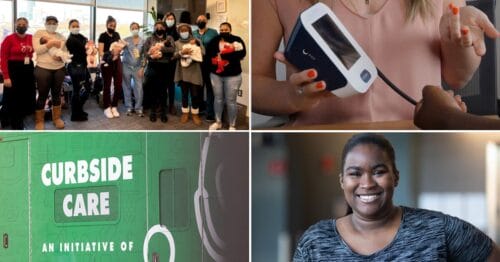Autistic People of Color Serve as Clinical Research Advisors in a New Project
January 18, 2022

Cecilie Arturs, Getty Images
Diversity in clinical research is essential, but often missing. Engaging autistic BIPOC adults as partners in autism research will build more effective, inclusive studies for better healthcare.
Engaging communities as partners in research is essential for ensuring that the right questions are asked, appropriate methods are used, results are interpreted in context, and findings are effectively translated. Yet, the experiences and perspectives of many communities are often missing from research studies, especially those of Black, Indigenous, and other people of color (BIPOC) autistic adults.
In an effort to increase representation for this community of people, researchers Megan Bair-Merritt, MD, MSCE, executive director of the Center for the Urban Child and Healthy Family at Boston Medical Center and professor of pediatrics at Boston University School of Medicine; Emily F. Rothman, ScD, professor and chair of the Department of Occupational Therapy at Boston University; and Sandy Magaña, PhD, MSW, professor in autism and neurodevelopmental disabilities at the University of Texas at Austin are spearheading a project to create an advisory board of 12 BIPOC autistic adults across the U.S. to serve as expert advisors to partner with autism researchers. Their aim is to improve community engagement with BIPOC autistic adults to find out what their needs are and to foster connections between them and autism researchers for more effective, inclusive studies.
Bair-Merritt and Rothman spoke with HealthCity to share the work they are doing through a new award from the Patient-Centered Outcomes Research Institute (PCORI) for their project, Building Capacity for CER/PCOR Participation Among BIPOC Adults on the Autism Spectrum.
HealthCity: How will your project help to improve inclusivity in autism research work?
Megan Bair-Merritt, MD, MSCE: The advisory group of 12 BIPOC autistic adults will be joining meetings where we will provide them with the information and training that they need in order to become expert consultants on research grants. This includes explaining the process and phases of standard research projects, the different roles that people play in research meetings, and what they can expect when they participate in a meeting with a research team. We are starting by building trust and cohesion between all of us on the advisory board.
The next phase includes the generation of information and materials that will be created together to be shared with autism researchers. This will allow researchers to have an easier time being inclusive when they welcome autistic BIPOC adults onto their research teams.
For example, some autistic individuals may have preferences about communication. They may not like keeping their camera on during Zoom meetings. They may prefer to use the chat or use an audio-assistive communication device. The autism researchers should be prepared to make their team meetings more inclusive by offering varied methods of participation and communication in a way that will work for each autistic individual.
HC: Why is it important that inclusivity goes beyond just including BIPOC autistic adults as study participants?
MBM: It’s important that BIPOC autistic people are part of research efforts, not just as participants in research or the subjects but as advisors and consultants, in order to live up to the phrase, “Nothing about us without us.” The slogan advocates for disability rights and really speaks to how important it is to keep the people that the research is trying to help at the center.
HC: Is supporting the health of autistic people a public health priority?
Emily Rothman, ScD: The National Institutes of Health recognize the importance of promoting health for autistic people. And the National Institute of Mental Health’s strategic plan includes several points that support the idea that advancing autistic health is important. Given that autistic people experience stigma, discrimination, and structural barriers to equity in health, and are also at increased risk of suicide, self-harm, and depression, there’s a clear need to figure out what we can do to better meet the needs of this population.
HC: What does this project mean in terms of diversity and inclusion in research?
ER: What’s important is that people don’t have to pick just one piece of their identity; they can show up as a whole person. For example, the advisory board of autistic people of color includes a number of nonbinary people as well. So, we will tend to the whole picture of who they are and advocate for inclusiveness on research teams.
HC: Was this project created to improve autism-specific research, or is the goal to set a standard for all research to be more inclusive of BIPOC autistic adults?
ER: Participants will be prepared to join research teams on any topic. The starting place is autism research, because autism research teams, specifically, should be inclusive of all autistic individuals and BIPOC autism. Skills and capacity building will absolutely mean that participants can also join research groups in other topic areas looking to become more inclusive as well.
HC: What has the feedback been from members of the advisory board?
ER: Advisory board members are really excited to give their input to researchers and to be included in an effort like this to make their voices heard. That feeling is coming from a place of wanting ableism to be addressed and wanting their autistic-specific needs to be acknowledged and attended to, as well as their identity. Whether they are an indigenous person, multi-racial, Black—they want that part of their identity to be recognized and attended to as well by research teams.
HC: What is the long-term goal of this initiative?
MBM: Ultimately, we want to pave the way for better inclusiveness in research. When we start seeing more inclusion of BIPOC autistic individuals on research teams of all kinds, that’s how we will measure success.


